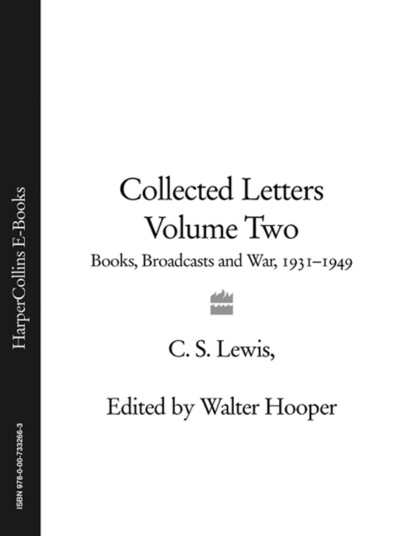(#ulink_dea74eb4-552f-54ec-b22d-7511805c763f) but I intend to ‘one of these days’. I shall be very interested to hear what you think of him. My own growing suspicion is that he can’t be so bad as our critical tradition (a very flippant, elegant, belle-lettristic tradition) makes out. If Shelley likes an author
(#ulink_12b7f642-7161-5659-8a38-713ed7e427db) and the Saintsburies and Raleighs and Garrods sneer at him—well, it makes one wonder. I hope you will find time to let me know how he struck you.
With many thanks.
Yours sincerely
C. S. Lewis
TO DOM BEDE GRIFFITHS (W):
Magdalen College,
Oxford.
29th April 1938
Dear Griffiths
It was nice to hear from you again and of course I read the articles with interest.
(#ulink_cd499cad-bf00-5929-bcbe-9f61480d473c) I think at the top of p. 8 in the first you might have expressed more clearly the actually antimoral side of romanticism you were in when we first met.
(#ulink_9f600c3c-5f0c-5ffc-845f-08ef3916c086) Have you forgotten that in our fiercest arguments you were actually defending cruelty and lechery. On p. 9—is it your considered view that Berkeleyian idealism is to be found in the Confessions? I shd. doubt it.
(#ulink_21383767-964f-5f71-a8f4-4a3340eaf819) ‘Strange as it may seem’ a few lines lower is ambiguous. I take it you mean it was strange that this shd. have been a discovery.
(#ulink_75048cd8-9dd2-52e2-8c5b-4a75f5a1d055) In next para. I shd. have liked an explicit statement of the view you then expressed to me, in words that I have never forgotten ‘The choice in the long run is between Christianity and Hinduism’.
In the second article your account of the night of prayer (p. 31)
(#ulink_f0ef2c44-90ca-5f1f-a012-d9fa3f97feb1) omits a v. interesting fact you told me shortly after it—that what started you off was the consciousness of sin in some religious writer you were reading which you could not share tho’ you were satisfied on objective grounds that you were more sinful than the writer. They are nice, plain articles and very clear.
I have been in considerable trouble over the present danger of war. Twice in one life—and then to find how little I have grown in fortitude despite my conversion. It has done me a lot of good by making me realise how much of my happiness secretly depended on the tacit assumption of at least tolerable conditions for the body: and I see more clearly, I think, the necessity (if one may so put it) which God is under of allowing us to be afflicted—so few of us will really rest all on Him if He leaves us any other support.
About our differences: I feel that whenever two members of different communions succeed in sharing the spiritual life so far as they can now share it, and are thus forced to regard each other as Christians, they are really helping on re-union by producing the conditions without which official reunion would be quite barren. I feel sure that this is the layman’s chief contribution to the task, and some of us here are being enabled to perform it. You, who are a priest and a theologian, are a different story: and on the purely natural & temperamental level there is, and always has been, a sort of tension between us two which prevents our doing much mutual good. We shall both be nicer, please God, in a better place. Meanwhile you have my daily prayer and good wishes.
Yours
C. S. Lewis
TO JOHN BETJEMAN (VIC):
(#ulink_e5919f24-43a3-567a-b718-28aa89e64fd8)
Magdalen College, Oxford. May 28th 1938
Dear Betjeman
Mea culpa! I don’t like to think how long these two books of yours have been on my shelves and my conscience. Not that I’ve been reading them—I’m afraid the mere reluctance to let books go—and a still greater reluctance to put up a parcel—has been the main factor. Your pardon.
Why do you never drop in and see me?
Yours
C. S. Lewis
TO JOHN BETJEMAN (VIC):
Magdalen College, Oxford. June 3rd 1938
Dear Betjeman
Sorry, I couldn’t manage Whit Monday, but very many thanks. Pay my respects to that very great man Dawkins.
(#ulink_6817c3bd-8142-5e1b-bd7c-e7ba4ebcf637)
Yours
C. S. Lewis
TO CHARLES WILLIAMS (W):
[Magdalen College] June 7th 1938.
[Dear Williams]
Though I have not yet finished it I feel I must write and congratulate you on producing a really great book in your He Came Down from Heaven.
(#ulink_0718cb22-5ce5-56d5-912f-272f289c4009) It is thickly inlaid with patins of bright gold—‘He does not exist primarily for us’ (p. 3)—‘All that could be said would be that they had not yet happened’ (p. 6).
(#ulink_c95dfb6e-0344-57dd-993b-c56c5c8124b2) (This is really overwhelming. I honestly think it quite likely that when we are in our graves this may become one of the sentences that straddle across ages like the great dicta of Plato, Augustine, or Pascal)—on Bible-worship of the odious new ‘literary’ sort (7, 8.)
(#ulink_bf9c4d8d-21c8-5b51-a710-2e1aabb11bba)—and every word on p. 25.
(#ulink_2890542b-da85-5d0c-998f-53b551a5faa3) And it’s so clear, which at one time I should never have expected a book of yours to be.
Damn you, you go on getting steadily better ever since you first crossed my path: how do you do it? I begin to suspect that we are living in the ‘age of Williams’ and our friendship with you will be our only passport to fame. I’ve a good mind to punch your head when we next meet.
[C. S. Lewis]
TO OWEN BARFIELD (W):
Magdalen College,
Oxford.
June 10th 1938








 Рейтинг:
0
Рейтинг:
0